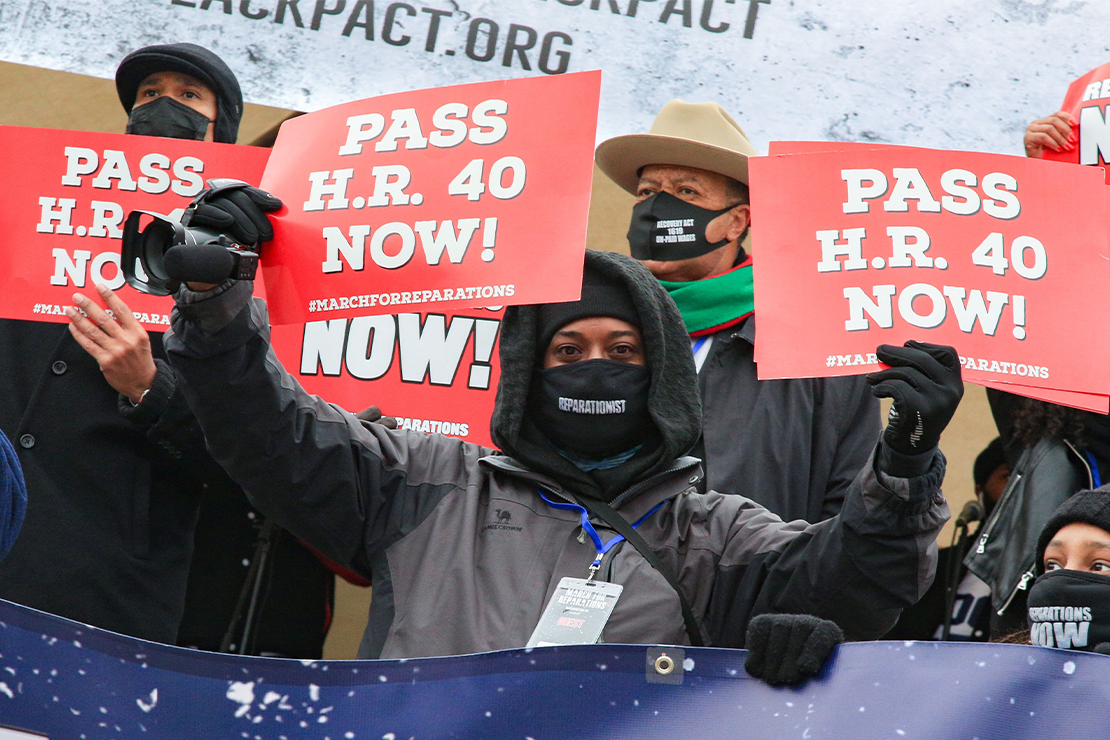Once dismissed by many as impractical, the quest for reparations for the descendants of African people enslaved in the United States is now being embraced as a legitimate concept to be taken seriously. The remedy is not only being sought to address harms from the enslavement era, but also for lingering impacts which manifest today. The illegal kidnapping, cultural assault, and nearly 300 years of forced free labor, followed by 100 years of convict leased labor, Black codes, sharecropping, the peonage system, lynchings, mass murders, systemic racism, Jim Crow, gerrymandering, redlining, educational inequities, health disparities and mass incarceration, still reverberate within the collective genes of Black people in this country.
These harms were multi-faceted; thus, remedies must be as well. Indeed, reparations can be fashioned in as many ways as necessary to equitably address the countless manifestations of injustice emanating from America’s original sin.

Protestors gather at the Lincoln Memorial in Washington, D.C. demanding reparations and the passing of H.R.40.
Credit:
Bryan Dozier/Shutterstock
Talk of reparations is no longer fringe, but now front and center. There are multitudes of faith organizations, sororities and fraternities, professional and social justice groups and civil and human rights organizations working to advance reparations. Support for federal reparations legislation is escalating under the leadership of Rep. Sheila Jackson Lee, who has generated more co-sponsors to H.R. 40 than ever in history. President Biden must take heed and expeditiously bring its objectives into existence via executive order.
Rep. Cori Bush has also recently introduced a comprehensive Reparations NOW resolution that addresses issues of systemic inequality. California passed legislation establishing a state-wide commission to study and develop reparations proposals, and has issued a comprehensive report for consideration. Cities across the country are establishing commissions and task forces, looking into abuses in their own backyards.
Leaders across the country are taking notice: The U.S. Conference of Mayors, the Players Coalition of professional athletes, coaches and owners across leagues, Amalgamated Bank, and many more have picked up the banner to endorse reparations. White allied groups are also committed to truth-telling. Ben and Jerry’s Ice Cream has issued a call to corporations to collectively use their power and privilege to reckon with the past.
The Virginia and Princeton theological seminaries are addressing reparations, and dioceses of the Episcopal Church in several jurisdictions have committed financial restitution as a moral acknowledgment of the church’s historic complicity. The financial backers of many of the country’s top universities were wealthy slave owners, an ugly truth that can no longer be pushed aside. Georgetown University, which stands today because of the sale of Black people owned by its founding Jesuits, has announced a $100 million commitment towards a foundation for descendants of those that saved the university from bankruptcy. Harvard University has dedicated $100 million to begin to atone for its extensive ties to enslavement and perpetuation of racial inequality. And in Virginia, a reparations bill was passed by the state legislature in 2021 that targets five schools with ties to slavery, including the University of Virginia and the College of William and Mary, all of whom owe their foundational success to the forced labor of enslaved human beings who helped build and run the institutions in their early days.
Caskets are opening across the country, revealing burgeoning evidence of racial atrocities, lynchings, and massacres. Past damages are being uncovered and redressed: In California, the state has acknowledged the governmental theft of the lucrative Black-owned Bruce’s Beach property, and passed legislation to return it to its rightful owners. There are current efforts for redress from Ocoee, Florida’s 1920 election day bloodbath, and the 1919 terrorism that ravaged Elaine, Arkansas’ Black community.
The land housing the unimaginable horrors of Atlanta’s Chattahoochee Brick Company, which perpetuated slavery through convict leasing, is being reclaimed by the people, and displaced families in Palm Springs, California are seeking compensation and atonement for the callous razing and eviction of an entire community.
In Tulsa, Oklahoma, renewed litigation is underway to achieve reparatory justice for the violent massacre of Black Wall Street. Recommendations from the commission formed in 2000 and charged with investigating the 1898 racial insurrection and coup d’état in Wilmington, North Carolina still await passage by the legislature. In 2019, remnants from the slave ship Clotilda were discovered, which in 1860 illegally transported Africans to Mobile Bay, Alabama — more than 50 years after the slave trade was abolished. Today, their descendants are exploring amends.
The role that federal, state, and local governments; corporations, industries, religious institutions, educational institutions, private estates, and other entities played in supporting the institution of slavery and its living legacies can no longer be ignored, dismissed, or swept under the rug. It’s a new day, with new energy and new possibilities. The fruit that we see today emanated from historic seeds that were planted and watered for generations. Reparations is no longer a stretch of the imagination or an unattainable goal but, very likely, a reality, and achievable in our lifetime.
Date
Monday, June 19, 2023 - 6:00amFeatured image




